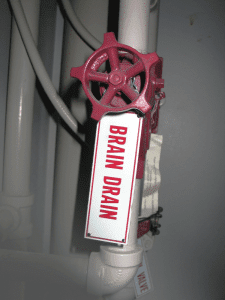By Ira S Wolfe
Appeared in Business2Business, June 2008
 The alarm that has been ringing in the ears of senior managers and business owners lately has become louder and more painful as they see retirements and job-hopping drain their organizational “brain power.” It has become all too obvious that companies have not done a very good job of documenting and retaining the knowledge of their key personnel and subject matter experts.
The alarm that has been ringing in the ears of senior managers and business owners lately has become louder and more painful as they see retirements and job-hopping drain their organizational “brain power.” It has become all too obvious that companies have not done a very good job of documenting and retaining the knowledge of their key personnel and subject matter experts.
Every organization can learn a lesson from British Petroleum.
In February 2006 a small leak in a quarter-inch hole in the Prudhoe Bay pipeline was discovered. By August 2006, oil spills forced a shutdown of the largest U.S. oilfield. Overnight, 8% of domestic oil production was shut down and hundreds of thousands of crude oil was spilled.
A Congressional investigation followed and it was discovered that BP’s senior corrosion engineer retired just a few years earlier. The job had been left unfilled for more than a year creating a huge knowledge gap. This vacancy, and others, hindered BP’s ability to maintain a strategic view of its corrosion prevention activities.
Clearly, BP did not document nor retain the knowledge of its senior corrosion engineer. But BP is not unique. Unfortunately poor knowledge management and lack of talent planning is strangling many organization’s ability to execute their growth plans. Ask yourself: who is holding the knowledge in my organization that could prevent the “quarter-inch hole” from turning into a disaster resulting in catastrophic loss of customers, suppliers, employees and most important – trust.
Stop the brain drain
To begin to capture and transfer knowledge in your organization, where do you start? I offer the following steps.
Identify your subject matter experts and super-experts. If any of these experts were to leave your organization tomorrow and on the way out the door offered to “dump their brains” along with their ID badge and key on your desk, what knowledge would you want them to leave behind? What questions must you ask if you have any chance of capturing what you need to know?
Be careful what you ask for. A corollary to this brain dump is: what do you do with this pile of knowledge left behind? Just like cleaning out your file cabinets and closets, all the information you find may not be relevant. You’ll likely find that experts are mental “packrats.” They keep everything because you just never know when they might need that information. After they are long gone, someone will need to decide what to keep, what to archive, and what to trash.
Identify the right recipients. If you expected that this transferred knowledge will continue to live without support, you’re in for a big surprise. The receiver can’t just take the “mental” boxes left at his door and file them away for safekeeping. This successor must take the information and integrate, not just file, it into his or her own knowledge base. Not everyone has the cognitive capacity, interest, or motivation to do this.
Assess the talent pool. After you identify the employees who you believe are capable of capturing knowledge, it is essential that you assess them for cognitive capacity and potential. It is not enough to identify just the smart and ambitious employees. A successful transfer of knowledge will require that the receiving employee(s) have the ability to deal with added levels of complexity, ambiguity and responsibility. If you’re not sure who these recipients are, it is even more important to scan your entire workforce for successors.
Mentor, mentor, mentor. Now that you’ve identified your experts and successors, it is time to pair them up. Many relationships will develop naturally. Others will struggle. It takes time to build trust. Many experts have a difficult time communicating at a level that the rest of the world understands. Some will be reluctant to share their knowledge sensing their value in the organization will diminish once they reveal what they know. The mentor may need to be coached on how to mentor and the mentee how to learn. Potential personality rifts must be recognized up-front or the talk of knowledge transfer will remain just that – talk. The same employee assessments used to identify the right talent can be used to pair the right mentor with the right mentee.
Don’t plan like you have a tomorrow. Start today. You can plan for retirements but you can’t plan for illness, disability, and deaths of key employees or those who leave your flock for greener pastures. Knowledge transfer at the implicit level takes years, not months or weeks.
